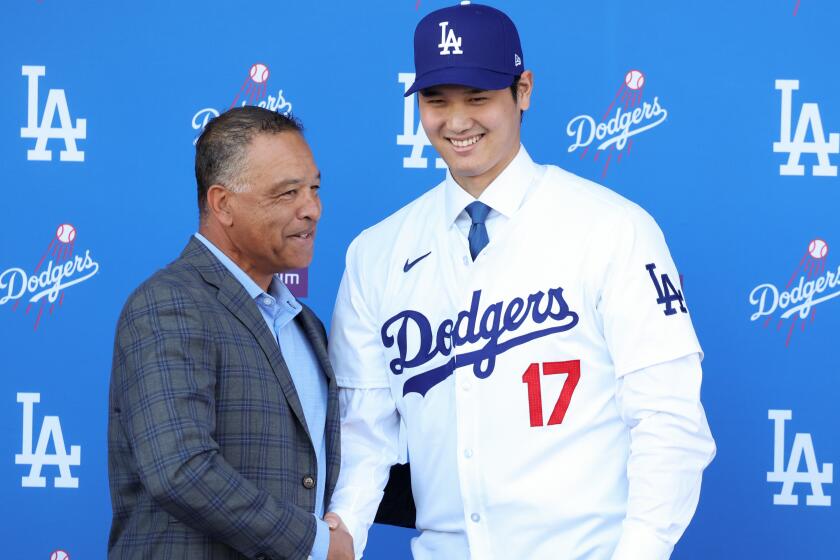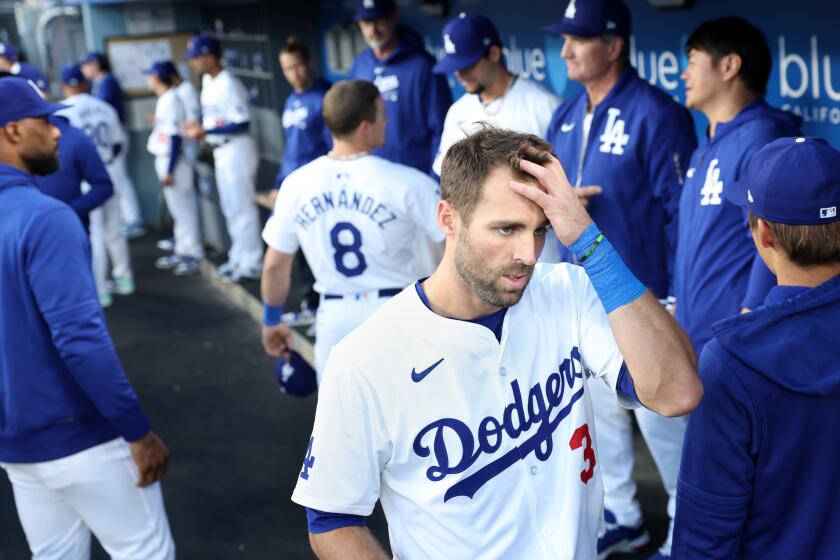Dodger Sale Cost Them Guerrero
Vladimir Guerrero last week showed the Dodgers what he could have done for them, hitting two home runs, scoring five runs and driving in three as the Angels took two out of three games in an interleague series at Dodger Stadium.
His contribution was especially frustrating for the Dodgers because they were runner-up in the bidding for the All-Star right fielder, one of the top players in last winter’s free-agent class.
They believed they were so close to signing him, in fact, that top club executives were exchanging high-fives in their offices. The celebration was premature, however, because concerns that the lucrative agreement might complicate the sale of the team scuttled the deal.
As the Angels play host to the Dodgers through the weekend at Angel Stadium, Guerrero has remained the focus of attention.
“He makes a difference for any team that he’s on, any lineup that he’s in,” Dodger leadoff batter Dave Roberts said. “For us to have been close to getting him ... obviously, it makes it a little bit tougher.”
The Dodgers were very close to bringing Guerrero to Chavez Ravine, according to numerous baseball sources, including current and former Dodger officials.
“We made a deal with Guerrero,” former chairman Bob Daly said in the June 28 editions of New York Newsday. “It was done, everything but the signature.”
So what happened?
“I don’t have anything else to say,” said Daly, who had previously declined comment on the Guerrero negotiations. “But, yes, it’s true. We did have a deal.”
Owner Frank McCourt’s leveraged $430-million bid to purchase the franchise, and the length of the approval process, thwarted the Dodgers’ attempt to sign Guerrero, sources involved in the negotiations said.
McCourt said the previous regime decided not to sign Guerrero.
“At the time of the Vlad Guerrero signing, I did not own the Dodgers, nor did I yet have the approval of Major League Baseball for the purchase of the Dodgers,” McCourt said. “At that time, I did not have any authority to sign -- or block -- the acquisition of Guerrero.
“Was I asked my opinion about signing Guerrero? Yes. I gave prior ownership an absolute thumbs up. But at the end of the day, player acquisitions were, at that time, the sole responsibility of the prior ownership.”
The Dodgers at the end of the 2003 season determined they needed to improve a batting order that scored the fewest runs in the major leagues, but former general manager Dan Evans was working under restrictions imposed because of the pending sale of the franchise from News Corp. to McCourt.
Although McCourt could not officially direct the club while the approval process unfolded, the Dodgers had to inform him of any liabilities that might affect his bid, and he already had behind-the-scenes power. Moreover, McCourt unofficially set the 2004 payroll at $100 million, limiting the pool of free agents and potential trades the club could pursue.
In late December, Evans initiated contract discussions with Arn Tellem, Guerrero’s lead agent. Guerrero sat out 39 games last season because of a herniated disk in his back, stirring concern about the durability of a player who had batted .323 and averaged 38 homers and 113 runs batted in during his first six full seasons, all with the Montreal Expos.
The Baltimore Orioles offered Guerrero a six-year, $78-million contract. The New York Mets bid five years and $71 million, but guaranteed three years and $30 million, the rest of the offer in incentive clauses tied to playing time.
Guerrero’s back injury did not require surgery, and he returned to play in 62 of the Expos’ final 64 games in 2003. The Dodgers determined Guerrero was worth the risk, but McCourt had to be convinced to make a commitment in the $70-million range.
McCourt’s initial reaction was that the price was too high. But the Boston real estate developer changed his mind, at least in part, because of a letter from Daly in which the longtime Dodger fan implored McCourt to approve the deal for the good of the franchise and Los Angeles.
McCourt agreed, but Daly and Evans still had to adhere to McCourt’s $100-million payroll limit. In order to clear the hurdle, the Dodgers had to persuade Guerrero to play for considerably less money in the first year with them than he would have received elsewhere. Manager Jim Tracy, who had been the Expos’ bench coach for Guerrero’s first two-plus seasons, and coach Manny Mota helped to make the Dodgers’ pitch.
Guerrero agreed to play for $5 million in 2004 -- as part of a five-year, $70-million deal -- for the right to opt out of the contract after the third year. If he exercised the option, Guerrero would have forfeited $35 million in the remaining two guaranteed years of the deal, with salaries of $17.5 million in 2007 and 2008.
The sides had even agreed on Guerrero’s partial no-trade list and discussed having a news conference in late January at Dodger Stadium to introduce him. But then the commissioner’s office privately informed News Corp. and McCourt that another $70-million commitment could create a debt-equity imbalance that might impede the sale approval process. The commissioner’s office denied raising concerns.
McCourt informed the Dodgers he would not move forward with Guerrero. Daly expressed confidence he could still sign Guerrero and help McCourt receive approval, so he personally spoke with Guerrero and asked Tellem to wait for the Dodgers until sale paperwork was completed in a Jan. 22 meeting at New York.
Daly, Evans and assistant general manager Kim Ng celebrated with high-fives in Ng’s office on reaching an agreement in principle with Guerrero on Jan. 9. But then Tellem informed Daly that Guerrero, concerned about waiting for the Dodgers, had instead accepted a five-year, $70-million offer from the Angels.
“It was tough just because of the state of the ballclub,” catcher Paul Lo Duca said. “We didn’t know if we had a GM. At the time, we didn’t have an owner set.
“We didn’t know what was going on. It would be different if we had everything set and we got him. The guy is an unbelievable player.”
Guerrero is challenging for the Triple Crown in his first season in the American League. He is second in the AL with 69 runs batted in, third with a .342 batting average and tied for fifth with 19 home runs.
Guerrero’s contributions have helped the Angels remain in contention in the AL West despite injuries to many key players in the first half. The Dodgers are also in contention in the National League West despite having scored fewer runs than every NL team except Montreal.
No matter what occurred in the off-season, Guerrero said he landed in the right spot with the Angels.
“I just wanted to go somewhere where I could be comfortable,” Guerrero said. “The guys here have made me feel like I’ve been here many years, so I’m very comfortable.”
*
Times staff writer Bill Shaikin contributed to this report.
More to Read
Are you a true-blue fan?
Get our Dodgers Dugout newsletter for insights, news and much more.
You may occasionally receive promotional content from the Los Angeles Times.






